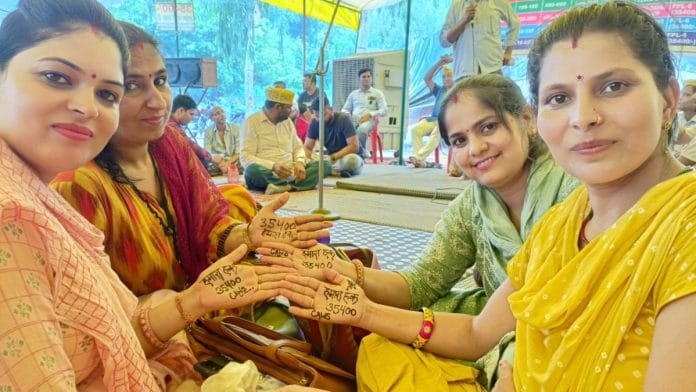Chandigarh: Suresh Chander, a resident of Fatehabad district in Haryana, purchased a used car through a car dealer in June this year. When he approached the registration authorities to get the vehicle transferred in his name 7 July, he found the process could not be completed as clerks across departments were on an indefinite strike demanding a better pay.
Meanwhile, the seller is pressuring him to expedite the process. Vikash Sharma, who works with the car dealer, said at least 35 such cases — registration of new vehicles and transfer of ownership — of cars bought from his agency alone are pending with the authorities because of the strike.
“In a small district like Fatehabad, there is a backlog of at least 200 cases of vehicle registration and 300 cases of transfer of old vehicles because of the strike. Issuance of driving licences and other services provided by the government are also on hold for now,” Sharma said to ThePrint.
Likewise, in Panipat, Gulshan Kumar cannot register the sale deed of a plot of land.
“I entered into an agreement to purchase a residential plot on 12 April. According to our agreement, I was supposed to get the sale registered in my name on or before 12 July,” he told ThePrint
“But I haven’t been able to do so because of the strike. My lawyers point out the delay is not of my doing but the seller doesn’t want to keep waiting endlessly and is pressuring me to pay the agreed amount. But why should I pay up without registering the plot [in my name]?” he added.
The Clerks Association Welfare Society (CAWS) in Haryana, aligned with the Bharatiya Mazdoor Sangh, proceeded on strike 5 July while those associated with the Haryana Ministerial Staff Association owing allegiance to Sarv Karmchari Sangh began strike on 12 July. They are demanding a starting pay of Rs 35,400 per month against their current Rs 19,900 per month and say they will continue their indefinite strike if the demand is not met.
Vikrant Tanwar, state president of CAWS, said around 20,000 clerks are on strike currently and are sitting on dharnas outside mini-secretariats of their respective districts. Women clerks in several districts are writing Rs 35,400 on their hands in mehndi and posting their pictures on social media.
Even as the government provides 342 G2C (Government to Citizen) services through its e-services (Saral) portal, a clerk’s role is critical to the process. “Once a citizen applies for a service on the portal, their file is put up before the concerned officer for approval. The actual work of initiating the file and then putting it up before the officer is done by the clerical staff,” said a representative of the clerks association Saturday, requesting anonymity.
Some work has been left outside the purview of the strike, however.
“We have informed the government that we will not say no to any work related to disaster management, or election-related duties, but we will not perform any other duties,” said Shiv Kumar Sheoran, state president of Haryana Ministerial Staff Association while talking to ThePrint Friday.
He added: “In Haryana, the ministerial staff (clerks) get a starting basic pay of Rs 19,900, while our counterparts in Punjab start at a basic salary of Rs 32,100. Before the 2014 assembly polls, the then Congress government led by Bhupinder Singh Hooda had announced pay scales equivalent to Punjab and had promised to introduce the new pay scales from 1 November 2014.”
“Even the BJP government that came to power in October 2014 promised pay scales on par with those in Punjab…Had we received pay scales equivalent to Punjab in 2014, our salary after the 7th pay panel in 2016 would have been Rs 35,400,” said Sheoran.
Talks with CM Manohar Lal Khattar’s Officer on Special Duty (OSD) Jawahar Yadav last Thursday were inconclusive, said the staff on strike. The Union leaders have sought a meeting with the CM but that hasn’t materialised yet.
Speaking to ThePrint, OSD Yadav said, “The striking clerks told me that they were being discriminated against since 1969. The BJP came to power in 2014 only. I can only speak to the CM once I am satisfied by their demands.”
Also read: ‘Will destroy wildlife’ — Haryana govt’s ambitious Aravalli jungle safari project challenged in SC
‘Discrimination since 1969’
Sharing a copy of the undated memorandum submitted to OSD Yadav, CAWS chief Tanwar told ThePrint that clerks, multipurpose health workers (MPHWs), junior basic training (JBT) teachers, junior engineers (JEs) in various departments and deputy rangers in the forest department got the same starting basic pay of Rs 60 after the first pay commission of 1957.
At that time, the current Haryana was still part of Punjab. However, by the time the 2nd pay panel report came in 1969, Haryana was a separate state, carved out of Punjab in 1966.
He pointed out that over the years, through various pay commissions, the disparity between starting salaries continued to grow, so much so that the 6th pay commission recommendations placed clerks and MPHWs at a basic starting salary of Rs 5,200 each, JBT teachers, JEs, and Deputy Rangers were at that of Rs 9,300 each.
After the 7th pay panel recommendations that came in during Khattar’s tenure in 2016, the basic salary of clerks was at Rs 19,900, even as the MPHWs were shifted to a starting salary of Rs 35,400, which was also the pay fixed for JBT teachers, JEs and forest rangers, he said.
(Edited by Smriti Sinha)
Also read: Furore over chest measurement criterion for women forest officials. Haryana takes out rule book






